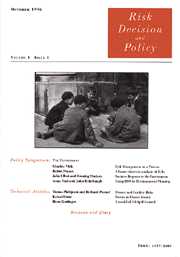Article contents
Risk perception and risk attitude in informed consent
Published online by Cambridge University Press: 25 June 2002
Abstract
The standard account of the ‘reflection effect’ (Kahneman and Tversky, 1979) is that attitude toward risk changes across gain or loss framings of outcomes. Weber and Bottom (1989) proposed an alternative account in which decision makers have stable risk attitudes, but changing risk perceptions. Undergraduates were randomly assigned to read one of three hypothetical informed consent documents from a trial of a cholesterol-lowering drug. Documents used gain, loss or both framings to describe expected benefits. Respondents rated riskiness of participation and non-participation in the trial and made a choice about whether they would participate in the trial.
The reflection effect was replicated. In addition, as predicted by the Weber and Bottom account, respondents in the gain condition were more likely to rate participation as riskier than non-participation compared to respondents in the loss condition, and in each condition more than 70 per cent of respondents chose to avoid the option they judged as riskier. Implications for informed consent are discussed.
- Type
- Technical Paper
- Information
- Copyright
- © Risk Decision and Policy, 2002
- 10
- Cited by


